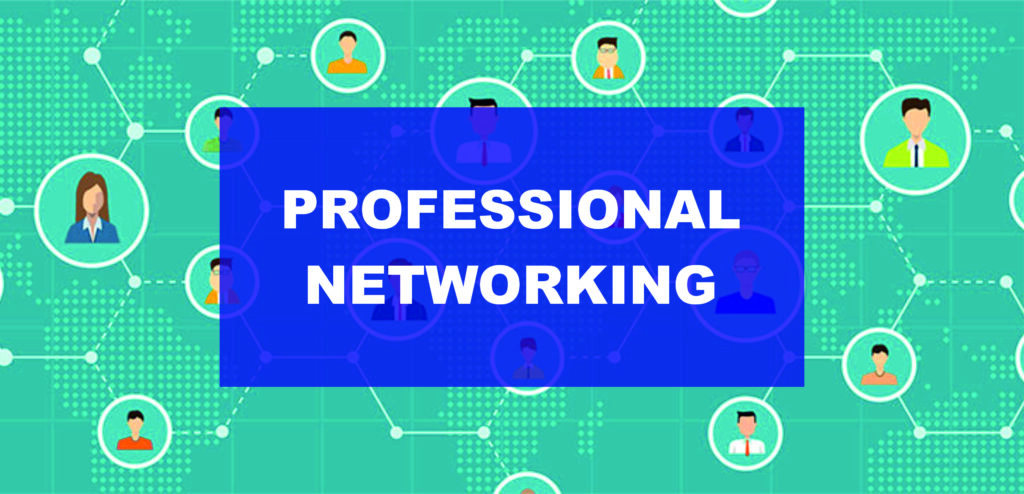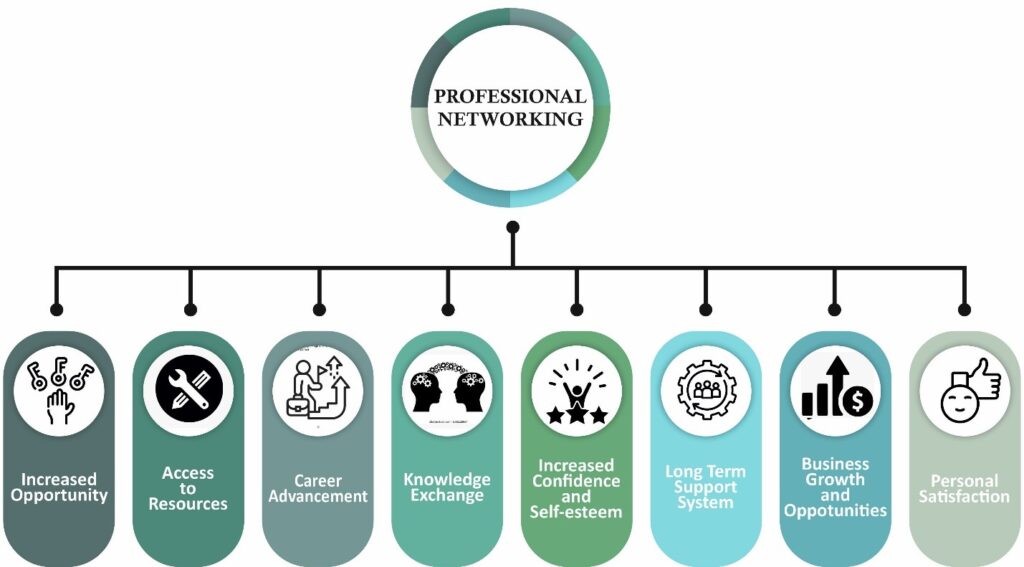The Power of Professional Networking: Building Bridges to Success

In today's interconnected world, professional networking has become an indispensable tool for career growth and success. Beyond a mere exchange of business cards or online connections, networking has evolved into a strategic practice that can open doors to new opportunities, foster collaborations, and accelerate professional development. In this thought leadership piece, we will explore the power of professional networking and share insights on how to build meaningful relationships that can propel your career to new heights.
1. Embracing the Networking Mindset:
Networking is not just an activity to be checked off a to-do list; it's a mindset that permeates your professional life. Embrace the mindset of curiosity, generosity, and a genuine desire to connect with others. Approach networking as an opportunity to learn, share knowledge, and contribute to the success of others.
2. Building Authentic Connections
Successful networking is built on authenticity. Focus on building genuine relationships based on trust, respect, and mutual benefit. Take the time to understand others' interests, challenges, and goals. Be a good listener and demonstrate empathy. Authentic connections formed through networking can become long-lasting partnerships that support and propel both parties forward.
3. Leveraging the Power of Digital Platforms:
Digital platforms, especially LinkedIn, have revolutionized how professionals’ network. Harness the power of these platforms to expand your reach, connect with industry peers, and showcase your expertise. Engage in meaningful conversations, contribute valuable insights, and demonstrate thought leadership to establish yourself as a trusted authority in your field.
4. Nurturing and Maintaining Relationships:
Building a network is not a one-time activity; it requires ongoing nurturing and maintenance. Regularly engage with your connections, whether through online interactions, attending industry events, or scheduling one-on-one meetings. Stay updated on their professional journeys and offer support whenever possible. Investing time and effort into cultivating relationships creates a strong network that can be tapped into when needed.
5. Paying It Forward: Becoming a Connector:
Networking is not solely about what you can gain; it's also about what you can give. Act as a connector within your network, introducing individuals who can benefit from knowing each other. By becoming a hub of valuable connections, you position yourself as a trusted resource and enhance your own reputation within your professional community.
6. Networking Beyond Your Industry:
While networking within your industry is important, don't limit yourself solely to those boundaries. Expand your horizons by seeking connections from diverse backgrounds and industries. Cross-pollination of ideas and perspectives can spark innovation and open doors to unexpected opportunities.
Individuals, communities, and countries over the years that prioritize professional networking have benefited from enhanced opportunities, knowledge exchange, access to resources, and increased visibility within their respective industries or regions as seen in the examples listed.
Silicon Valley, USA:
Silicon Valley has been a hub for technological innovation and entrepreneurship, largely due to the strong network of professionals and organizations in the region. Through networking events, conferences, and collaborative initiatives, entrepreneurs, engineers, and investors in Silicon Valley have connected, shared ideas, and formed partnerships that have led to the growth of numerous successful tech companies.

Richard Branson:
Richard Branson, the founder of Virgin Group, is known for his extensive network of connections. His ability to build relationships and network with influential individuals has played a significant role in the success of his businesses. Through his networking efforts, Branson has gained access to resources, funding, and partnerships that have helped him expand his empire across various industries.
Oprah Winfrey:
Oprah Winfrey, the media mogul, has leveraged her extensive network to build her media empire. Through her connections, she has secured high-profile interviews, formed partnerships with influential individuals and organizations, and built a strong audience base. Her networking skills have played a vital role in her career success and the establishment of her brand.


Israel's Startup Ecosystem:
Israel has a thriving startup ecosystem, often referred to as the "Startup Nation." The success of Israel's startup scene can be attributed in part to the country's strong culture of networking. Israeli entrepreneurs actively participate in networking events, meetups, and accelerator programs, connecting with investors, mentors, and industry experts. This networking culture has fuelled collaboration, knowledge exchange, and access to resources, contributing to the growth of numerous successful startups.
LinkedIn:
LinkedIn, the professional networking platform, has benefited millions of individuals and organizations worldwide. It has revolutionized professional networking by providing a digital platform for professionals to connect, share knowledge, and build relationships across industries and geographic locations. LinkedIn has facilitated job opportunities, business partnerships, and knowledge sharing on a global scale.


Singapore:
Singapore has strategically focused on building a strong network of professionals and organizations to establish itself as a global business and financial hub. The country has developed a thriving ecosystem of networking events, industry conferences, and business forums that bring together professionals from diverse sectors. This networking culture has attracted investments, fostered innovation, and positioned Singapore as a regional hub for business and entrepreneurship.
The examples above express the value of professional networking. We will summarise the benefits of professional networking for individuals and communities into eight points.
I. Increased Opportunities
Networking opens doors to a wide range of opportunities, including job opportunities, business partnerships, collaborative projects, speaking engagements, and mentorship opportunities. By expanding your network, you increase your chances of coming across new and exciting opportunities that can advance your career or business.
II. Access to Resources:
Building a strong professional network provides access to valuable resources. This can include access to industry insights, best practices, specialized knowledge, research findings, funding sources, and connections to influential individuals. Having access to such resources can give you a competitive advantage and help you stay informed and up-to-date in your field.
III. Career Advancement:
Networking can accelerate your career advancement. By connecting with influential professionals and decision-makers in your industry, you increase your visibility and build relationships with individuals who can advocate for your professional growth. They can provide guidance, mentorship, and potentially open doors to promotions, leadership roles, or career transitions.
IV. Knowledge Exchange:
Networking facilitates the exchange of knowledge and information. Engaging with professionals from different backgrounds and experiences can expose you to new ideas, perspectives, and industry trends. By actively participating in discussions, attending industry events, and sharing your expertise, you contribute to the collective knowledge within your network and enhance your own learning.
V. Increased Confidence and Self-esteem:
Networking allows you to expand your circle of professional contacts and build relationships with like-minded individuals. Engaging with others, sharing your experiences, and receiving support and encouragement can boost your confidence and self-esteem. It provides a platform to showcase your skills, achievements, and unique qualities, reinforcing your professional identity.
VI. Long-term Support System
A strong professional network can serve as a long-term support system. Having trusted connections who understand your industry and professional challenges can offer advice, share experiences, and provide emotional support when needed. These relationships can be invaluable throughout your career journey.
VII. Business Growth and Opportunities:
For entrepreneurs and business professionals, networking is essential for business growth. Building relationships with potential clients, partners, suppliers, and investors can lead to new business opportunities, collaborations, and referrals. Your network can become a valuable source of leads, customers, and strategic alliances.
VIII. Personal Satisfaction:
Lastly, networking can bring personal satisfaction and fulfillment. Connecting with professionals who share similar interests and passions can create a sense of belonging and camaraderie. Building genuine relationships, helping others, and being part of a supportive professional community can contribute to overall happiness and well-being.

Professional networking at the country level can enhance collaboration, knowledge exchange, and economic opportunities, ultimately contributing to the growth and development of the nation. Below are some benefits to the country.
Economic Growth:
Professional networking fosters collaboration, knowledge sharing, and business partnerships, which can contribute to economic growth. By connecting professionals, companies, and industries, countries can attract investments, promote innovation, and create new job opportunities. Networking also facilitates the exchange of ideas, best practices, and technology transfer, leading to increased productivity and competitiveness.
Knowledge and Skills Development:
Networking allows countries to tap into global knowledge networks, gaining access to expertise, research findings, and best practices from around the world. This can support the development of domestic industries, educational institutions, and research centers. By connecting with professionals from different countries, countries can foster cross-cultural learning and acquire new skills and knowledge to address local challenges.
Trade and Export Opportunities:
Professional networking can open doors to trade and export opportunities. By establishing connections with professionals and businesses in other countries, countries can explore new markets, establish distribution channels, and develop partnerships for international trade. Networking events, trade shows, and business forums provide platforms for countries to showcase their products and services to a global audience.
Diplomatic Relations and Collaboration:
Networking plays a crucial role in building diplomatic relations and fostering collaboration between countries. By connecting diplomats, policymakers, and professionals from various sectors, countries can strengthen their international partnerships, promote cultural exchange, and facilitate collaboration in areas such as trade, technology, research, and education. Networking can also help countries navigate diplomatic challenges and build mutual understanding.
Investment and Entrepreneurship:
Professional networking can attract foreign investments and promote entrepreneurship within a country. By building connections with investors, venture capitalists, and business leaders, countries can showcase investment opportunities, create favourable investment climates, and support the growth of local startups. Networking events and initiatives that bring together entrepreneurs and investors can facilitate access to capital, mentorship, and expertise.
Knowledge Diplomacy:
Networking can contribute to knowledge diplomacy, where countries use their networks to share knowledge, expertise, and resources for mutual benefit. By actively engaging in international networks, countries can build trust, enhance their reputation, and leverage partnerships to address global challenges collaboratively. This can lead to joint research projects, knowledge exchange programs, and initiatives that drive sustainable development and innovation.

Networking can contribute to knowledge diplomacy, where countries use their networks to share knowledge, expertise, and resources for mutual benefit. By actively engaging in international networks, countries can build trust, enhance their reputation, and leverage partnerships to address global challenges collaboratively. This can lead to joint research projects, knowledge exchange programs, and initiatives that drive sustainable development and innovation.







